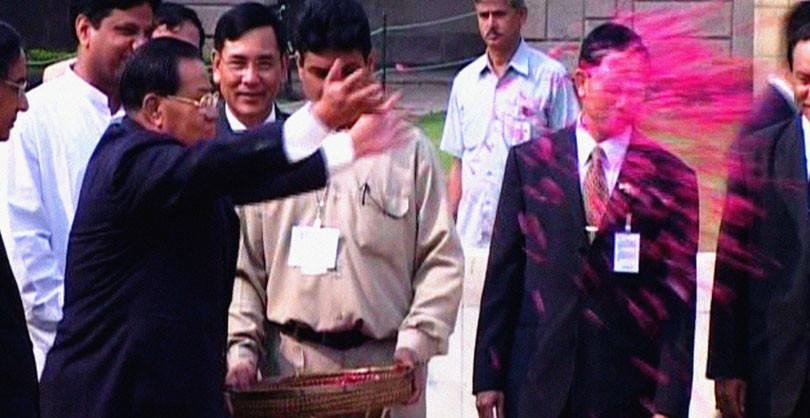amar kanwar - the torn first pages (part I)
Exhibition — Sep 5 until Sep 30, 2008
In the coming art season, Stedelijk Museum Amsterdam and Stedelijk Museum ’s-Hertogenbosch (SM’s) have joined forces to present two video installations by Indian artist Amar Kanwar (New Delhi, 1964). This double presentation is a unique opportunity to get acquainted with the work of this compelling Indian artist whose work responds to issues in contemporary Indian life. Kanwar’s video essays numbered among the highpoints of the last two Documentas in Kassel.
The first part of Amar Kanwar’s new three-part installation The Torn First Pages (2008) will be screened in Docking Station, the project space for young international artists in Stedelijk Museum CS. SM’s in ‘s-Hertogenbosch is presenting the installation The Lightning Testimonies (2007).
The Torn First Pages is a three-part installation on the political and humanitarian situation in Burma(Myanmar). For this piece, Kanwar drew inspiration from the story of a book-dealer in Mandalay who was imprisoned for tearing out the first page of every book. These pages bore odes to the military regime and taunts addressed to the democratic movement in Myanmar.
Docking Station is screening part one of The Torn First Pages, which consists of six videos in colour and black and white projected onto fragile sheets of paper. Kanwar: ‘Imagine twenty sheets of paper floating in the wind, each with translucent moving images from within Burma and across the globe.’
The videos from part one of The Torn First Pagesare: The Face, Thet Win Aung (a&b), Ma Win Maw Oo, The Bodhi Tree and Somewhere in May. The various parts are based to some extent on film and video material shot clandestinely in Burma. Kanwar is in contact with the Burmese resistance movement and trains ‘amateurs’ to shoot footage surreptitiously for inclusion in his work. Some of the material, however, was shot outside Burma in India, Europe, the US and Thailand. In The Face we see footage of general Than Swe, head of the Burmese junta who, in 2004, visited Rajghat, the site of Gandhi’s cremation. Swe’s visit was extremely controversial. The general is known for being very particular about his media representation but Kanwar managed to video Swe as he scattered rose petals at the hallowed place.
The various parts of The Torn First Pagesmetaphorically refer to the struggle for a democratic society, exile, memory and individual courage.
The Torn First Pages was commissioned by Public Press and Thyssen-Bornemisza Art Contemporary; the complete series will be shown in the Haus der Kunst in Munich from October 8 - November 9, 2008.
Docking Station is screening part one of The Torn First Pages to coincide with the violent suppression, exactly one year ago, of the monks’ protests inBurma. This year, in early May, the situation in that country deteriorated even further in the wake of the Nargis cyclone. For more information and reports on the political and humanitarian situation in Burmaplease go to: www.humanrightswatch.org andwww.burmacentrum.nl.
In Stedelijk Museum Bulletin no.2 / 2008 the artist is interviewed by Martijn van Nieuwenhuyzen, curatorStedelijk Museum and organiser of the exhibition in Docking Station, about The Torn First Pages. The publication is on sale in the museum shop for € 5.
The Torn First Pages is the last presentation in the Docking Station series in Stedelijk Museum CS.
SM’s
From 5 September – 16 November 2008, SM’s in ’s-Hertogenbosch will be screening Amar Kanwar’s installation The Lightning Testimonies, which premiered last year at Documenta 12. In the film, Kanwar reflects on the history of conflict in the Indian sub-continent by tracing experiences of sexual violence. With eight synchronised projections, the video installation is a moving, immersive experience.
The individual projections tell the stories of women from different times and regions. Each narrative centres on the body both as a site for hate and humiliation, and as a basis for dignity, honour and protest. Drawing on different visual vocabularies, inThe Lightning Testimonies Kanwar transports the viewer from a realm of pain and terror into a space of quiet contemplation.
Curator: Elly Stegeman. More information is available at: www.sm-s.nl
Amar Kanwar
The poetic documentary films and video works of Amar Kanwar are primarily concerned with issues relating to politics, society, and economic and ecological conditions in the Indian sub-continent. Much of Kanwar’s work explores the legacy of de-colonialisation and Partition where the separation of families, sectarian violence and border conflicts are axiomatic themes. Kanwar creates lyrical, contemplative filmic essays through image, ritual objects, literature, poetry and songs. His work creates a space that, rather than dwelling on traumatic or political situations, attempts to move beyond trauma and its representation.
Kanwar presented The Lightning Testimonies at Documenta 12 (2007) and exhibited the acclaimed film A Season Outside (1997) at Documenta 11 (2002). His work has been screened at the Sydney Biennial and in the Whitney Museum, New York. Recent solo exhibitions include: Marian Goodman Gallery, Paris (2008), Whitechapel Art Gallery,London (2007), APJ Media Gallery, New Delhi (2007), Nasjonalmuseet, Oslo (2006) and The Renaissance Society, Chicago (2004). Kanwar has taken part in numerous major film festivals throughout the world. He received an Honorary Doctorate in Fine Arts from the Maine College of Art (US, 2006), the 1st Edvard Munch Award for Contemporary Art in Norway(2005), the MacArthur Fellowship in India and The Golden Gate Award of the San Francisco International Film Festival 1999.

